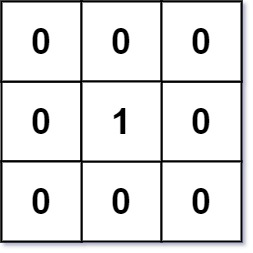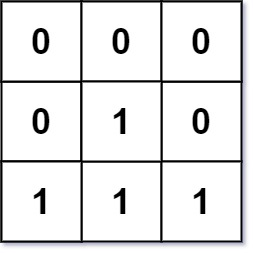给定一个由 0 和 1 组成的矩阵 mat ,请输出一个大小相同的矩阵,其中每一个格子是 mat 中对应位置元素到最近的 0 的距离。
两个相邻元素间的距离为 1 。
示例 1:
输入:mat = [[0,0,0],[0,1,0],[0,0,0]] 输出:[[0,0,0],[0,1,0],[0,0,0]]
示例 2:
输入:mat = [[0,0,0],[0,1,0],[1,1,1]] 输出:[[0,0,0],[0,1,0],[1,2,1]]
提示:
m == mat.lengthn == mat[i].length1 <= m, n <= 1041 <= m * n <= 104mat[i][j] is either 0 or 1.mat中至少有一个0
方法一:多源 BFS
初始化结果矩阵 ans,所有 0 的距离为 0,所以 1 的距离为 -1。初始化队列 q 存储 BFS 需要检查的位置,并将所有 0 的位置入队。
循环弹出队列 q 的元素 p(i, j),检查邻居四个点。对于邻居 (x, y),如果 ans[x][y] = -1,则更新 ans[x][y] = ans[i][j] + 1。同时将 (x, y) 入队。
class Solution:
def updateMatrix(self, mat: List[List[int]]) -> List[List[int]]:
m, n = len(mat), len(mat[0])
ans = [[-1] * n for _ in range(m)]
q = deque()
for i, row in enumerate(mat):
for j, v in enumerate(row):
if v == 0:
ans[i][j] = 0
q.append((i, j))
dirs = [(0, 1), (0, -1), (1, 0), (-1, 0)]
while q:
i, j = q.popleft()
for a, b in dirs:
x, y = i + a, j + b
if 0 <= x < m and 0 <= y < n and ans[x][y] == -1:
ans[x][y] = ans[i][j] + 1
q.append((x, y))
return ansclass Solution {
public int[][] updateMatrix(int[][] mat) {
int m = mat.length, n = mat[0].length;
int[][] ans = new int[m][n];
for (int i = 0; i < m; ++i) {
Arrays.fill(ans[i], -1);
}
Deque<int[]> q = new LinkedList<>();
for (int i = 0; i < m; ++i) {
for (int j = 0; j < n; ++j) {
if (mat[i][j] == 0) {
ans[i][j] = 0;
q.offer(new int[] {i, j});
}
}
}
int[] dirs = new int[] {-1, 0, 1, 0, -1};
while (!q.isEmpty()) {
int[] t = q.poll();
for (int i = 0; i < 4; ++i) {
int x = t[0] + dirs[i];
int y = t[1] + dirs[i + 1];
if (x >= 0 && x < m && y >= 0 && y < n && ans[x][y] == -1) {
ans[x][y] = ans[t[0]][t[1]] + 1;
q.offer(new int[] {x, y});
}
}
}
return ans;
}
}class Solution {
public:
vector<vector<int>> updateMatrix(vector<vector<int>>& mat) {
int m = mat.size(), n = mat[0].size();
vector<vector<int>> ans(m, vector<int>(n, -1));
queue<pair<int, int>> q;
for (int i = 0; i < m; ++i) {
for (int j = 0; j < n; ++j) {
if (mat[i][j] == 0) {
ans[i][j] = 0;
q.emplace(i, j);
}
}
}
vector<int> dirs = {-1, 0, 1, 0, -1};
while (!q.empty()) {
auto p = q.front();
q.pop();
for (int i = 0; i < 4; ++i) {
int x = p.first + dirs[i];
int y = p.second + dirs[i + 1];
if (x >= 0 && x < m && y >= 0 && y < n && ans[x][y] == -1) {
ans[x][y] = ans[p.first][p.second] + 1;
q.emplace(x, y);
}
}
}
return ans;
}
};use std::collections::VecDeque;
impl Solution {
#[allow(dead_code)]
pub fn update_matrix(mat: Vec<Vec<i32>>) -> Vec<Vec<i32>> {
let n: usize = mat.len();
let m: usize = mat[0].len();
let mut ret_vec: Vec<Vec<i32>> = vec![vec![-1; m]; n];
// The inner tuple is of <X, Y, Current Count>
let mut the_q: VecDeque<(usize, usize)> = VecDeque::new();
let traverse_vec: Vec<(i32, i32)> = vec![(-1, 0), (1, 0), (0, 1), (0, -1)];
// Initialize the queue
for i in 0..n {
for j in 0..m {
if mat[i][j] == 0 {
// For the zero cell, enqueue at first
the_q.push_back((i, j));
// Set to 0 in return vector
ret_vec[i][j] = 0;
}
}
}
while !the_q.is_empty() {
let (x, y) = the_q.front().unwrap().clone();
the_q.pop_front();
for pair in &traverse_vec {
let cur_x = pair.0 + x as i32;
let cur_y = pair.1 + y as i32;
if Solution::check_bounds(cur_x, cur_y, n as i32, m as i32) && ret_vec[cur_x as usize][cur_y as usize] == -1 {
// The current cell has not be updated yet, and is also in bound
ret_vec[cur_x as usize][cur_y as usize] = ret_vec[x][y] + 1;
the_q.push_back((cur_x as usize, cur_y as usize));
}
}
}
ret_vec
}
#[allow(dead_code)]
pub fn check_bounds(i: i32, j: i32, n: i32, m: i32) -> bool {
i >= 0 && i < n && j >= 0 && j < m
}
}func updateMatrix(mat [][]int) [][]int {
m, n := len(mat), len(mat[0])
ans := make([][]int, m)
for i := range ans {
ans[i] = make([]int, n)
for j := range ans[i] {
ans[i][j] = -1
}
}
type pair struct{ x, y int }
var q []pair
for i, row := range mat {
for j, v := range row {
if v == 0 {
ans[i][j] = 0
q = append(q, pair{i, j})
}
}
}
dirs := []int{-1, 0, 1, 0, -1}
for len(q) > 0 {
p := q[0]
q = q[1:]
for i := 0; i < 4; i++ {
x, y := p.x+dirs[i], p.y+dirs[i+1]
if x >= 0 && x < m && y >= 0 && y < n && ans[x][y] == -1 {
ans[x][y] = ans[p.x][p.y] + 1
q = append(q, pair{x, y})
}
}
}
return ans
}

